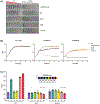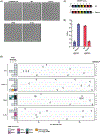A dynamic subpopulation of CRISPR-Cas overexpressers allows Streptococcus pyogenes to rapidly respond to phage
- PMID: 38997519
- PMCID: PMC11983678
- DOI: 10.1038/s41564-024-01748-0
A dynamic subpopulation of CRISPR-Cas overexpressers allows Streptococcus pyogenes to rapidly respond to phage
Abstract
Many CRISPR-Cas (clustered regularly interspaced short palindromic repeats and CRISPR-associated protein) systems, which provide bacteria with adaptive immunity against phages, are transcriptionally repressed in their native hosts. How CRISPR-Cas expression is induced as needed, for example, during a bacteriophage infection, remains poorly understood. In Streptococcus pyogenes, a non-canonical guide RNA tracr-L directs Cas9 to autorepress its own promoter. Here we describe a dynamic subpopulation of cells harbouring single mutations that disrupt Cas9 binding and cause CRISPR-Cas overexpression. Cas9 actively expands this population by elevating mutation rates at the tracr-L target site. Overexpressers show higher rates of memory formation, stronger potency of old memories and a larger memory storage capacity relative to wild-type cells, which are surprisingly vulnerable to phage infection. However, in the absence of phage, CRISPR-Cas overexpression reduces fitness. We propose that CRISPR-Cas overexpressers are critical players in phage defence, enabling bacterial populations to mount rapid transcriptional responses to phage without requiring transient changes in any one cell.
© 2024. The Author(s), under exclusive licence to Springer Nature Limited.
Figures











References
-
- Pul Ü. et al. Identification and characterization of E. coli CRISPR-cas promoters and their silencing by H-NS. Mol. Microbiol 75, 1495–1512 (2010). - PubMed
MeSH terms
Substances
Grants and funding
LinkOut - more resources
Full Text Sources
Molecular Biology Databases

